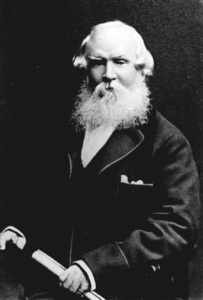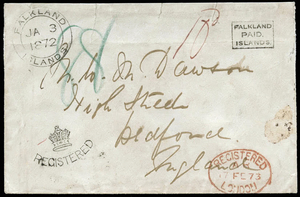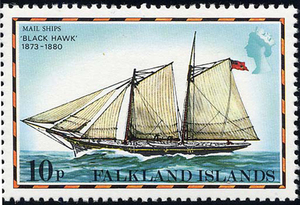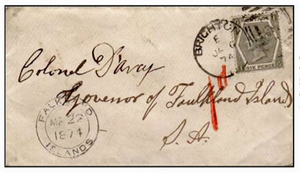D'ARCY, GEORGE ABBAS KOOLI
1818 - 1885 from England
governor, was born in 1818, the eldest son of Colonel Joseph D'Arcy, Royal Artillery, and Lady Catherine West, daughter of Earl De La Warr. The name of Abbas Kooli was given to him because his father had trained an artillery corps for the Shah of Persia. The Shah Abbas Khan requested Colonel D'Arcy on parting: 'When you have a son, name him after me'. Joseph D'Arcy fulfilled the request but, being a modest man, he named his child Abbas Kooli, not wishing to take the title Shah as well as his name. Whereas 'Khan' signifies Highness, 'Kooli' means ordinary. Their mother having died when George was three, he and his younger brother, Robert were sent to boarding school in England.
On leaving Sandhurst in 1837, D'Arcy was appointed to the 94th Regiment in Ireland as an ensign and served for two years as adjutant; he then went on to India with his regiment where he served for twelve years as Aide de Camp to five successive governors. He was gazetted major in the 3rd West India Regiment and appointed to command the troops at Nassau, Bahamas, eventually being promoted lieutenant-colonel in command of the regiment at Jamaica and retiring in 1858.
In 1859 D'Arcy was appointed governor of the disease-ridden dependency of the Gambia River on the west coast of Africa where he remained for seven years doing great works, building roads, draining swamps, rescuing refugees from the tribal wars and was finally involved in fierce fighting to protect the colony from invading tribes. He returned to England in 1867 and in March 1870 was appointed governor of the Falkland Islands.
At the time of his arrival in Stanley the farmers on the then newly settled West Falkland were in a state of collapse, facing bankruptcy, having spent their capital on the purchase of stock, buildings, drainage and fencing. Without waiting for approval from London, D'Arcy put into effect ordinance No 6 of 1870, extending settlers' leases on both islands from ten to twenty-one years, reducing the rental from 10 shillings to 6 shillings an acre for the first ten years and the purchase price from 8 shillings to 2 shillings an acre. When the Colonial Office heard of it, the ordinance was disallowed and D'Arcy was told that under no circumstances could land be sold for less than 4 shillings an acre. Meanwhile he had sold 800,000 acres at 2 shillings an acre. In 1871, however, a new ordinance was passed, reducing the price of land to 4 shillings an acre but embodying all the other benefits of the disallowed Ordinance.
The ten years extension gave the struggling farmers on West Falkland a new lease of life and renewed energy: instead of giving up, some found new partners with capital to join them, others worked on alone. As a result, by the mid 1870s sheep farming was not only well established but prospering. So much so that in 1877 the farmers on West Falkland were able to charter ships to bring out stores and take home their wool clip without calling at Stanley.
In 1872, D'Arcy introduced a mail service between Port Stanley and West Falkland. Mail was taken by horse to Port Sussex on Falkland Sound, then across to Port Howard on West Falkland by schooner, using first the government schooner Foam and then the Falkland Islands Company's schooner Black Hawk. Finally the mail was delivered by horse to the various farm settlements. For the settlers of West Falkland this was of great benefit as previously letters had been taking as long as four months to reach them after arrival at Stanley.
Two new roads were completed: one to the signal station at the back of Stanley and another from Stanley to Darwin. Stanley Cemetery was fenced in, the governor personally presenting two wrought iron gates for the entrance. Street lighting was first introduced in Stanley and the gaol was completed, as were a bonded warehouse, a new reservoir and a quarantine station.
His wife Caroline was an enthusiastic Catholic and incurred the wrath of the colonial chaplain, the Rev LORY, for her missionary activity. D'Arcy himself was hospitable to the first Catholic priests to visit during British rule, Father WALSH and Father FORAN.
As might be expected, Governor D'Arcy was very popular with Islanders, especially with the sheep farmers of West Falkland and, in 1876, when he was due to end his tour of duty, the colonists addressed a petition to Lord Carnarvon, secretary of state for the colonies, asking that he might serve another term:
We, the undersigned sheep-farmers and other inhabitants of the Falkland Islands, beg to humbly request your Lordship to advise Her Most Gracious Majesty to continue our present Governor, the Honourable Colonel D'Arcy, in his office for such another usual term of service... We consider the Governor's past rule marked in most matters by wisdom, and invariably by an earnest desire to do impartial justice, and to ameliorate the condition of all the Queen's subjects in his charge, more particularly of the humbler classes, those most needing his protection. His power and influence have been especially concentrated in an effort to build up and strengthen a respectable middle class, and it has met with considerable success.
We the undersigned sheep-farmers in particular, have great cause to be grateful to him and his predecessor in office, who initiated the present system of pastoral leases ...The sheep industry of the Colony, its most important and probably its only possible one, had been neglected, indeed discouraged, for upwards of thirty years; but the land, which had lain idle from the day of Creation until recently, will now in a few years be covered with thousands of sheep, which will add a very substantial and important item to the wealth of the Empire.
The petition was not to succeed, however, as by the time it was sent the new governor, Thomas CALLAGHAN, was already on his way. A memorial was later presented to D'Arcy signed by 130 people of Stanley, 'representing the working classes' of the Falkland Islands, extolling his virtues especially as the 'saviour' of West Falkland and praising him and his wife, Caroline, for all their good works.
The Colonial Office were less impressed with D'Arcy's talents as governor: his despatches were read with amusement and he was described as 'not a man of business'. Some years later an official minuted: 'we have had a very inefficient governor in this distant possession. He is an old man quite broken down and so now [1878] almost incapable. He carried on the government with the assistance of advances from merchants and others, on which he did not inform the Secretary of State'.
A small pension was granted and D'Arcy retired to Penzance in Cornwall. Once the Islands became financially self-supporting, he wrote to ask the Colonial Office whether he could be re-imbursed some of the expenses he had incurred as governor. After a long and painful illness, he died on 22 October 1885. The Colonial Office eventually gave his widow a small annuity. Two prominent hills on West Falkland are called after him and his wife: Mount D'Arcy and Mount Caroline.
External links
References
Comments
Revisions
July 2019 Two additional photographs added; references added
November 2019 One reference added
October 2020 One additional photograph added



